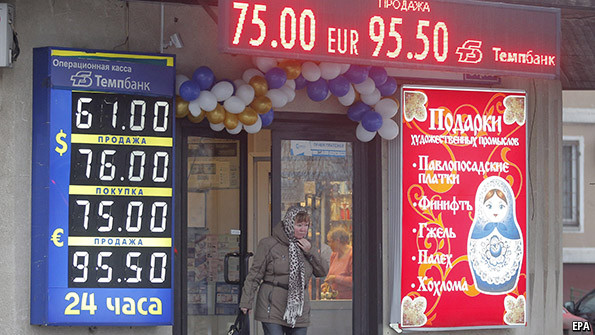The recession and currency crisis in Russia provides plenty of material for both AS and A2 students to get their teeth stuck into.
AS students could consider the inflationary effects of the plummeting rouble. With inflation at 9.1% and "Russian shopkeepers re-pricing their goods daily" it provides an excellent real world example of what is often referred to in textbooks as menu-costs.
With the rouble depreciation nearly 50% against the dollar in a matter of weeks it is also a useful example of imported inflation, pushing food price inflation to over 30%, which is eroding the living standards of the majority of working Russians.
A2 students could look at the attempts of the central bank to defend the currency. A 6.5 percentage point increase at 1am on the 16th December took the interest rate to 17%, a 12.5 point increase from the start of the year.
Russia has also spent some $80bn dollars in 2014 defending the value of the currency.
The initial effects of he rate rise was indeed to strengthen the rouble but the gains were
eroded and reversed by the end of the day. Lots of interesting discussions to be had about what drives currency movements.
There is also plenty of discussion about Russia's debt, both dollar-denominated and rouble-denominated. The ability of Russia pay back $115bn of dollar debt which is due in 2015 is increasingly being called into questions as the rouble depreciates.
This is obviously not just a Russian specific issue, the elections in Greece and the potential '
Grexit' could put Greece's euro-denominated debts under huge pressure.
All this is without even mentioning oil prices. Brent crude oil traded at
$50 yesterday, a fresh low.
 You need to understand not only that some countries have vast current account trade surpluses, as shown in this graph from The Economist in 2012, but also that some of those cash mountains are then used to fund buying government debt from countries.
You need to understand not only that some countries have vast current account trade surpluses, as shown in this graph from The Economist in 2012, but also that some of those cash mountains are then used to fund buying government debt from countries. 




